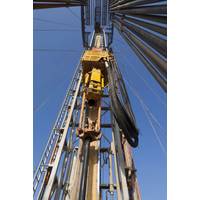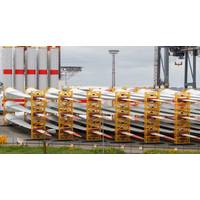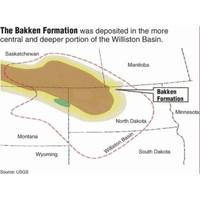Nigerian President Lifts Emergency Rule, Resuming Crude Exports

Nigerian President Bola Tinubu on Wednesday lifted a six-month emergency rule in Rivers State, reinstating Governor Siminalayi Fubara and other officials, after saying that a constitutional crisis that had paralysed governance had been resolved.The emergency rule, imposed on March 18, followed a standoff between Fubara and the state legislature that disrupted budget approvals and left the government in limbo. Tinubu said the measure was necessary to prevent anarchy.Rivers State, located in the oil-producing Niger Delta, is an important hub for Nigeria's crude exports.
Drilling Ban Proposals Divide Democrats

In the southeast corner of New Mexico, new houses, hotels and jobs are sprouting like flowers in the desert. Trucks hauling equipment and laborers jam once-barren highways on the way to thousands of oil rigs.The Democrats who control the state's government have lofty plans for the billions of dollars in projected tax revenues from the drilling industry in the Permian Basin, the world’s biggest oil field, starting with an overhaul of New Mexico's ailing public education system. The biggest threat to those plans, however, may be the presidential candidates from their own party.The top 10 Democratic contenders have called for ending new drilling leases on federal lands.
Atlantic Offshore Wind: Favorable Winds for Maritime

Now that the United States finally can envision steady winds blowing from the Atlantic Seaboard due to a pipeline of offshore wind farms on the horizon, the maritime industry can finally step up and earn some of the benefits. This includes shipbuilding, port construction, and worker training. This article reviews the key developments and forecasts the growth in maritime jobs.The federal and state governments share responsibility for developing offshore wind farms and bringing the wind into the power grid and, ultimately, to consumers.This shared responsibility arises from the fact that the federal government…
California Approves Fuel Tax Hike
California lawmakers on Thursday approved legislation to increase gasoline taxes and other transportation-related fees for the first time in decades, to fund an ambitious $52 billion plan to repair the state's sagging infrastructure. The legislation heads to the desk of Democratic Governor Jerry Brown, who urged its support after the Democratic-led state legislature passed it on Thursday with a 27-11 vote in the Senate and then a 54-26 vote hours later in the Assembly. "The Democratic Party is the party of doing things, and tonight we did something to fix the roads in California," Brown said during a news conference after the vote. "We got to fix them.
Dakota Denial Dampens U.S. Pipeline Outlook
The U.S. Army's denial of an easement for the Dakota Access Pipeline, after permitting and legal obligations were followed, sets an uncertain precedent for new projects despite President-elect Donald Trump's promise to support energy infrastructure. The decision came after months of protests by the Standing Rock Sioux tribe and others who said the line could desecrate tribal grounds, or a spill could contaminate drinking water. While most of the 1,172-mile (1,885-km) pipeline is complete, Energy Transfer Partners, the line's owner, needed an easement from the U.S. Army Corps of Engineers (USACE) to drill under Lake Oahe.
Pennsylvania Adopts New Fracking Regulations
New regulations governing the extraction of natural gas through fracking will go into effect on Saturday in Pennsylvania, the first overhaul since the industry took off in the state more than 10 years ago. The new rules allow the state's department of environmental protection to require additional measures if fracking is taking place near public resources, and requires drillers to restore water supply that is degraded or damaged through fracking, according to the statement. Environmental groups hailed the new rules. An oil and gas industry group blasted the regulations, with a spokesman saying he expected legal challenges.
Bill Creates 1,600MW Offshore Wind Procurement
On August 1, the Massachusetts State Legislature voted on and passed Bill H.4568 An Act to Promote Energy Diversity. The bill passed the State House 157-1 and the Senate passed the bill shortly after midnight. It will now go to Governor Charlie Baker for his signature. This is the first legislation of its kind that includes a specific carve out for offshore wind at a scale necessary to create a viable market in the United States. The bill requires big utilities to buy up to 1,600 megawatts of off-shore wind energy. This bill marks the start of the U.S. Pipeline.
Brazil's Rio de Janeiro State Plans to Withdraw New Oil, Gas Taxes
Brazil's Rio de Janeiro state plans to withdraw new taxes on oil and gas production before they take effect in March on concern the tax will hurt an already weak industry, a source involved in talks told Reuters on Friday. The tax, passed by the Rio de Janeiro state legislature last year in an effort to ease a growing financial crisis, immediately came under attack from industry leaders worried the levies would hit as oil prices fall to decade lows. The source, who asked for anonymity because talks about ending the tax are secret, said the governor and his cabinet have not yet chosen the legal justification they will use to block the tax law.
OK Regulator: Quake Increase a "Game Changer"
From June 17 to 24, there have been 35 earthquakes of magnitude 3.0 or greater in the state, according to the Oklahoma Geological Survey. Particularly worrying for regulators, some of the recent quakes occurred in the Oklahoma City metropolitan area, where there are no high-volume wastewater injection wells. The spike in quakes comes roughly two months after new rules governing the disposal of briny wastewater from drilling took full effect. Drillers were ordered by the Oklahoma Corporation Commission (OCC), which regulates the oil and gas industry…
Kemp: U.S. Crude Oil Stocks Return to 1930s Crisis Levels
U.S. commercial crude oil stocks last week hit their highest level since 1931 - when the opening of giant oil fields in the United States coincided with the Great Depression to create an enormous glut and sent prices tumbling to just 13 cents per barrel. Commercial crude stocks at refineries and tank farms across the country rose to almost 407 million barrels on Jan 23, up from 398 million the week before, according to the U.S. Energy Information Administration (EIA) (http://link.reuters.com/jax83w). Commercial stocks were the highest since the agency started collecting weekly data in 1982.
North Dakota Releases Internal Output Forecast
A stark breakdown from North Dakota projecting how falling oil prices could affect production was formulated using proprietary corporate data and a state official's personal model. Late last Thursday, the Department of Mineral Resources caused a stir in world oil markets by releasing slides from a presentation to the state legislature that included a range of output forecasts based on different oil price scenarios, including one showing production would begin to decline by the middle of this year if crude prices remained at current levels.
Battle Over Keystone XL Pipeline
Nebraska's Supreme Court ruled against a challenge to the Keystone XL oil pipeline's route through the state on Friday, clearing the way for the Republican-controlled U.S. Congress to try to force President Barack Obama to approve the project. The 1,179-mile (1,900-km) pipeline would send up to 830,000 barrels per day of oil sands crude from Hardisty, Alberta, across the U.S. border to Steele City, Nebraska, where it would connect with the project's already-built Gulf Coast leg. July 2008 - TransCanada Corp announces plans to expand its existing 590,000 bpd Keystone oil pipeline system to the Gulf Coast.
Bakken Players Need $55 for Viable Production
North Dakota needs an oil price of around $55 per barrel and a fleet of around 140 rigs to sustain production at the current level of 1.2 million barrels per day, the state's chief regulator told legislators yesterday. Department of Mineral Resources Director Lynn Helms outlined breakeven rates for wells across the state and production projections for a range of prices in a presentation for the House Appropriations Committee of the State Legislature (https://www.dmr.nd.gov/oilgas/presentations/FullHouseAppropriations010815.pdf). Breakeven rates for new wells…
Oil Train Regulation Passes in California
California lawmakers on Friday passed legislation requiring railroad companies to tell emergency officials when crude oil trains will chug through the state. The bill would require railroads to notify the state's Office of Emergency Services when trains carrying crude oil from Canada and North Dakota are headed to refineries in the most populous U.S. state. It passed its final vote in the Assembly 61-1, with strong bipartisan support within the state legislature in Sacramento. The bill now goes to Democratic Governor Jerry Brown for his signature.
North Dakota's Bakken Well Count Eclipses 15,000

The number of wells drilled in North Dakota has eclipsed 15,000 for the first time, underscoring the breakneck development of the state's Bakken shale formation, where more than 1 million barrels of oil are extracted each month. Crossing the threshold, which happened earlier this summer, according to regulatory data to be released later Tuesday, triggered a release of $587,000 from the state's budget to hire additional oilfield inspectors. Environmentalists, ranchers, farmers and other rural landowners have been clamoring for them. The state's Bakken shale formation is one of the most-prolific in the world…
Design Work to Start on New Alaska LNG Project

The state of Alaska and four energy firms have signed a joint-venture agreement to begin preliminary work on an 800-mile natural gas pipeline from the North Slope to a liquefied natural gas (LNG) export plant, Governor Sean Parnell said Wednesday. The agreement calls for partners to invest millions in so-called front-end engineering and design work over the next 18 months for the project, which could ultimately cost between $45 billion and $65 billion. The agreement comes two months after the state's legislature backed Parnell's plan to work with North Slope leaseholders Exxon Mobil…
Ohio Governor Freezes State's Clean Energy Law
Ohio Governor John Kasich on Friday signed legislation to freeze a six-year old law that required utilities to sell increasing amounts of green energy, making the state the first in the country to roll back a clean energy mandate. Kasich, a Republican mentioned as a possible contender for the 2016 presidential race, signed Senate Bill 310, which passed in the state's legislature with strong support from some of Ohio's biggest industrial power users, such as Alcoa, and the Ohio Chamber of Commerce. A number of other companies with operations in the state…
California Senate rejects bill to halt fracking
The California state Senate on Thursday rejected for the second year in a row a bill that would have put a temporary stop to the controversial oil-producing practice of fracking in the state. The measure failed with a handful of Democrats joining Republicans in defeating the bill. Fracking is when water, sand and chemicals are injected beneath ground to break up rock and release oil and natural gas into wells. Advancements in fracking and other well stimulation techniques have led to an energy boom in the United States. Environmentalists say the chemicals used in the process can pollute underground water supplies and cause other damage.